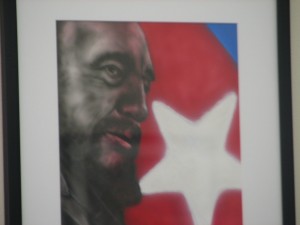Written by Editorial Board, Rizospastis, KKE (Communist Party of Greece)
On Friday the blogs which are guiding the movement of the “indignant†citizens published a statement of the “indignant†citizens in Syntagma Square [main square of Athens, Greece] that called on the left forces to leave the squares.
Thus, the “anonymous†leaders of the “movement of the squaresâ€, the “non-party alignedâ€, “spontaneousâ€, “non-politicised†citizens appear to be politicised and declaring themselves “anti-leftâ€.
Perhaps that’s the reason why they are hiding behind their anonymity. Up until this point they declared as their enemy the policy that brings poverty and unemployment while their slogan was to get rid of the memorandum and the politicians that implement it. This element along with the fact that they organise mobilisations expresses a political position.
Now they are showing one more aspect of their political stance and practice attributing the barbaric policy that leads the people and the youth to destitution generally to all the parties -including the KKE. Of course, they do not demonstrate who benefits from this policy; they do not show the real enemies which are the monopolies, the capitalists.
They are against the organised class-oriented trade union movement arguing that the trade unions must leave the squares. But the trade union movement is not homogenous. Is there any relation between the government and employer-led trade unionism that assisted the adoption of the barbaric measures and PAME that organised strikes and mass rallies against them along with PASEVE, PASY, OGE and MAS?
The self-definition of “non-party aligned†that they have used so far, which was extolled by the media groups of the capitalists, as well as their logic concerning the issue of democracy, proves to be nothing less than hypocrisy. Likewise, their intention to allegedly unite the people even on the basis of the vague anti-memorandum content of “the movement of the squares†since positions like “out with the leftâ€, “parties outâ€, “trade unions out†are divisive while they are not that democratic , or, to be more accurate, they are undemocratic.
At the same time, and while they oppose the memorandum and the horrible measures they do not say a word against the government, the EU, the political forces that agree with this policy. They are merely talking in general about the politicians who implement it with vague arguments while they equate the KKE with these parties.
The prevention of the political and ideological expression of the working people, who have the right to have their own point of view and express it openly and publicly in general and in particular within the movement, where the ideological political struggle unfolds, is not only at odds with democracy, especially within the movement, but it also muzzles it.
Furthermore, each movement, even the spontaneous ones but even more so the movement in the squares has an objective, no matter if one agrees with it or not. But this action reveals that the leaders of the movements of the squares have a point of view: either you come to the square with our ideological-political positions leaving yours out of the movement or don’t come at all, stay away from the squares.
It seems that it is a well elaborated tactic in order to draw dividing lines between popular forces which are organised in trade unions, parties, which do not conceal their ideology, their policy even their party identity and those who go to the squares, who are also ordinary people most of whom have believed in the bourgeois parties that betrayed their hopes for a better life, are disgusted with the bourgeois policy and are looking for a way out.
After all whom does the logic “parties and trade unions out†serve ? At this point, we will not repeat that those from the blogs are preparing a party with the name “Immediate Democracy†as stated on TV . But there is also one truth that they do not want to come to the fore, that they try to conceal as the bourgeois media do at times; namely that not all parties are the same, that the so called non-party movement of the squares is a political entity, which, although it calls itself non-party aligned, is a political entity and has a political position against the other parties irrespective of what it claims for itself.
From the first time that this form of mobilisations appeared we posed a question: Who is hiding behind the blogs and the internet? Why they do not appear? What does their anonymity mean? Shouldn’t this fact concern those who gather in the squares? Because they should know which forces invite them and organize these activities. Because the blogs are not enough, nor does everything begin spontaneously from a blog, even if they contribute to the mobilizations as does their huge promotion by the media.
But it seems that anonymity helps those who are behind the blogs and not only them. After all the experience of the people’s movement shows that there are also organised forces that appear as forces of the “movement†and oppose – no matter if they do it intentionally or not- the organised people’s movement while when they are in action they hide their faces with hoods.
Now the movement of those with no name has emerged. The people who are concealing themselves have a specific purpose, which they are also trying to hide. They present themselves as pro-people leaders but they do not point to the real opponent of the people.
The people who cover their faces with hoods oppose the state’s repressive mechanisms, the windows of shops and banks-they consider these to be their opponents and not the monopolies. Their activity fosters tendencies for the movement to lose its organized character, impede the participation of the people and does not cultivate a rebellious consciousness.
The procedures of direct democracy allegedly express participation from below in anti-memorandum activity. But which political force will impose its will so that the memorandum is abandoned? For them they are against politicians and political parties. So who will do it? Other politicians, and perhaps other organized forces with the political line which is being expressed in the squares, which are not against the monopolies and the capitalists. So we are talking about another reformed bourgeois system. Maybe this is their aim?
Of course, the specific view “parties out†makes some people from specific parties appear as defenders of their party line in the morning, they flatter those who express the “non-party position†despite the fact that these very people are leading party cadre, and in the evening they go to the squares as “non-party peopleâ€. This is hypocrisy on a massive scale, if not outright fraud. Ordinary people, young people participate in the squares to express their indignation, discontent, anger at the government, the EU, the Troika. But they do understand or do not accept the political line for the overthrow of the system.
These working people must not be ensnared in the net which the system is preparing through the so-called “non-party†and spontaneous. The conflict with the monopolies is not colourless. There needs to be a plan, a strategy, ideals, contribution and sacrifices. It means allying with the KKE, the class-oriented radical forces, new forces, which are starting to mobilise overcoming their inertia and tolerance, must make this step forwards.
“Parties out†is a conservative point of view. The political parties are organizations which with their political line and ideology express specific interests. Our society is divided into social classes and strata. The bourgeois class, on the one side, the dominant one, has the power, which some of its parties manage in the government and on the other side the working class. There exist intermediate strata which are differentiated economically, as well as socially. The intermediate strata, which are in a lower economic position, are objectively allies of the workers and opponents of the monopolies. The “parties out†view equates the KKE with the bourgeois parties. It conceals the real opponent of the people, the monopolies, which have the power.
The worker is deluding himself if he believes that the mobilizations in the squares are enough to liberate him from the old and new problems which have been foisted on him, without a movement which begins from and is rooted in the factories and industries, in every workplace, against the capitalist class. When the movement is not strong in the factories, whatever mobilisations take place do not have solid foundations. The real arena of class struggle is the workplace, the industry.
It is there where the workers come into daily uncompromising struggle with the big businessmen – which flows from their relative class relations, the relations of exploitation, because the wealth and profits of the capitalists are produced by the labour of the workers. Some say in the squares as well, and this is also necessary, but primarily in the place where the class opponents come into conflict. Here is the real core of the class-oriented political struggle.
The worker is deluding himself if he believes that people’s mobilizations must be far from all the parties or against all of them. Such a movement is condemned to be subjugated to the political line of the capitalists, to contribute to the perpetuation of exploitation.
The worker is deluding himself if he believes that the bourgeois political system can function in the people’s interests.
The bourgeois political system cannot be corrected, only overthrown.
The worker is deluding himself if he promotes the demand to get rid of the memorandum, without accompanying this with the demand for withdrawal from the EU and the overthrow of the state of the monopolies in Greece.
The people needs the movement which gives it a clear prospect. This means an organized struggle allied to the KKE, a struggle through the class-oriented movements of PAME, PASY, PASEVE, OGE and MAS. Only these forces can oppose the strategy of the monopolies and their servants with the strategy for the people’s interests.
Without such a strategy, the people will not find a way out.
Editorial board, Rizospastis, via 21st Century Manifesto
June 5, 2011













